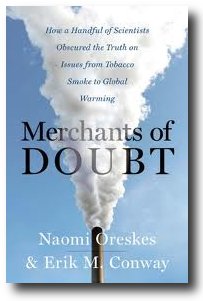 Reiner Grundmann has written a fairly damning review of Oreskes and Conway's Merchants of Doubt. I guess it's fair to say that he is not desperately impressed.
Reiner Grundmann has written a fairly damning review of Oreskes and Conway's Merchants of Doubt. I guess it's fair to say that he is not desperately impressed.
It is disappointing to see professional historians reduce the complexity to a black and white affair where it goes without saying what the preferred colour is. The social science literature relevant to the understanding of policymaking in the face of uncertainty is largely absent. The authors mention just one study, about rational decision theory, which is probably cited because it supports the authors’ claim that scientific uncertainty helps to prevent or delay political action. They missed the opportunity to confront their historical material with approaches that have examined the same case studies but did not come to the same conclusions. Reading Merchants of Doubt gives the impression that no such work exists. This raises the question of what epistemological status it can claim. Its authors have been critical of the scientific credentials of the contrarians, quoting the lack of peer review or selective use of information. This book has all the hallmarks of science (there are many footnotes) and perhaps it was even peer-reviewed. But it is what the title and subtitle suggest: less a scholarly work than a passionate attack on a group of scientists turned lobbyists and thus itself a partial account. I wonder if it does not do a disservice to the cause it is advocating.
I haven't troubled to read Merchants of Doubt before. I can't really see that changing in the near future.